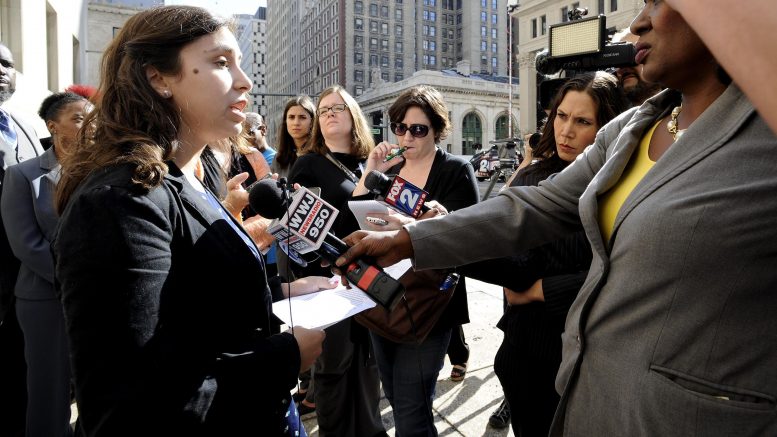“Instead of providing students with a meaningful education and literacy, the state simply provides buildings — many in serious disrepair — in which students pass days and then years with no opportunity to learn to read, write or comprehend,” states the 133-page complaint by the Los Angeles-based firm Public Counsel.
Attorneys representing the students say the filing highlights shocking problems in some Detroit schools and is the first of its kind in the nation that seeks to secure students’ legal right to literacy under the 14th Amendment. Specifically, it seeks to build on the notion of the landmark 1954 U.S. Supreme Court case, Brown vs. Board of Education, that an educated citizenry is critical to a well-functioning society.
Evan Caminker, former dean of the University of Michigan Law school who is an attorney on the case, expects the filing to “bring a new focus and new lens to the question of literacy.”
Caminker said U.S. Supreme Court justices in Brown v. Board of Education made it clear that all schoolchildren require a minimally acceptable education.
“The court also made clear that the exclusion of any group of students from that opportunity stamps them with a feeling of inferiority that can reach deep into their hearts and minds and last with them for their lifetimes,” Caminker said.
The suit seeks class-action status on behalf of all children who attend school in Detroit and alleges students in the city are functionally excluded from Michigan’s statewide system of education.
The lawsuit, filed in U.S. District Court in Detroit, alleges that decades of state disinvestment in and deliberate indifference to the Detroit schools have denied schoolchildren access to the most basic building block of education: literacy.
DPS has struggled for years with declining enrollment, comparatively low test scores and spending scandals that have left students without needed supplies. A $617 million aid package approved by lawmakers this summer relieved the district of nearly a half-billion dollar debt and provided $150 million in startup funding for a new, debt-free Detroit Public Schools Community District.
DPS had four emergency managers before March when Snyder installed Steven Rhodes, a retired federal judge.
“The lawsuit documents pervasive, shock-the-conscience conditions that deny children the opportunity to attain literacy, including lack of books, classrooms without teachers, insufficient desks, buildings plagued by vermin, unsafe facilities and extreme temperatures,” said Kathryn Eidmann, an attorney with Public Counsel. “One seventh- and eighth-grade classroom was taught for a month by an eighth-grade student.”
Snyder spokesman Ari Adler declined comment on the lawsuit. Chrystal Wilson, spokeswoman for the district, said its legal department is in the process of reviewing the lawsuit.
State Superintendent Brian Whiston, also named as a defendant in the lawsuit, on Tuesday said: “We are concerned with the literacy levels of all children in Michigan. However, we have not received the lawsuit yet and cannot speak directly to its claims.”
The plaintiffs are students at four of the lowest-performing schools at Detroit Public School Community District: Hamilton Academy, Medicine and Community Health Academy at Cody, Osborn Academy of Mathematics and Osborn Evergreen Academy of Design and Alternative Energy.
One plaintiff is a former student at Experiencia Preparatory Academy, a privately operated charter school that closed in June.
Eidmann said student-proficiency rates in these schools hover near zero in core subject areas. At Hamilton, 100 percent of sixth-graders scored below proficiency in both reading and math in the 2015-16 M-STEP results.
The lawsuit is asking the court to order the state to provide relief that includes “appropriate, evidence-based literacy” instruction at all grade levels and to address physical school conditions that impair access to literacy, Eidmann said.
Mark Rosenbaum, director of Public Counsel’s Opportunity Under Law project, said at a press conference today in Detroit that the lawsuit is not asking the state to provide anything more than what is necessary.
“This is not difficult stuff. Schools across the country, schools in Grosse Pointe, schools in Bloomfield Hills, schools in Ann Arbor all have the tools and the teachers and resources to provide literacy,” he said. “This is not a complicated solution.”
The complaint says “literacy is fundamental to participation in public and private life and is the core component in the American tradition of education. But by its actions and inactions, the State of Michigan’s systemic, persistent and deliberate failure to deliver instruction and tools essential for access to literacy in Plaintiffs’ schools, which serve almost exclusively low-income children of color, deprives students of even a fighting chance.”
The list of complaints against the schools include a lack of textbooks and instructional materials; a lack of basic classroom resources such as basic school supplies; overcrowded classrooms; a lack of English Learner instruction; and insufficient or unqualified staff.
The lawsuit alleges that mice, cockroaches and other vermin regularly inhabit classrooms and “the first thing some teachers do each morning is attempt to clean up rodent feces before their students arrive. Hallways and classrooms smell of dead vermin and black mold.”
“In one elementary school, the playground slide has jagged edges, causing students to tear their clothing and gash their skin, and students frequently find bullets, used condoms, used sex toys and dead vermin around the playground equipment. In another school, fires have broken out in hallways and the school lacks the capacity to notify students and teachers and even lacks regulation fire safety equipment,” the lawsuit says.
Renee Schenkman, a former teacher at Experiencia Preparatory Academy, said she felt helpless as her students struggled to learn in an environment that was literally deteriorating around them.
“For me, teaching felt less like a career and more like a veritable ‘Hunger Games,’ ” she said. “While I wish this was only a dark metaphor, it really did feel like my students and I were forced to endure conditions that were not only detrimental to their education but dangerous to their well-being.”
Sharlonda Buckman, head of the Detroit Parent Network, an advocacy group of DPS parents, added students are in school today without doors on bathroom stalls.
“Detroit will be great again when we do right by our children,” said Buckman, who appeared at the press conference in support of the suit. “We have had two decades of disinvestment into this system … we owe it to our kids to continue this fight.”
Public Counsel’s website says the firm has three main goals: protect the legal rights of disadvantaged children, represent immigrants who have been the victims of crime and foster economic justice by providing those in underserved communities with quality legal representation.
Rosenbaum said attorneys in the case, which also includes the firm of Sidley Austin, have been speaking with Detroit students for several months.
“Students and teachers approached us,” Rosenbaum said.
Detroit Federation of Teachers interim president Ivy Bailey said during the press conference that educators in the city have been raising the red flag about the district for more than a decade.
“Our schools are falling apart, our classrooms lack the basic resources needed to educate children and we have been forced to do more with less to give our students a shot at the American Dream,” Bailey said. “This lawsuit is not about individual teachers or individual schools. It’s about the quality of the Detroit school system and our community.”
American Federation of Teachers president Randi Weingarten said in a statement Tuesday that Michigan has been negligent in making sure Detroit students have the literacy skills needed to function in today’s society.
“This landmark federal case should be a wake-up moment to get the state’s attention and force it to remedy this crisis,” she said.
“Public education should be the great equalizer for our country, but sadly, that isn’t a reality. Detroit is a prime example of how government mismanagement and neglect can result in separate and unequal public education systems.”
In July, the firm Public Counsel filed a class-action lawsuit on behalf of former students of Corinthian Colleges, Inc. to stop illegal tactics by private debt buyers and debt collectors, who were attempting to collect millions of dollars of private student loan debt.
That month it also filed a lawsuit on behalf of a group of women workers and the SEIU California State Council challenging systemic gender discrimination in California’s workers’ compensation system.
Last month, a federal court approved a settlement between the City of Pomona, Calif. and homeless residents, under which the city will implement a new program to break the cycle of homelessness for 700 residents without homes. The settlement and court order grew out of litigation brought by Public Counsel and other firms.
Please visit the source link below to read the entire article.
Source: www.detroitnews.com





Be the first to comment on "Detroit Schoolchildren Denied Right to Literacy"